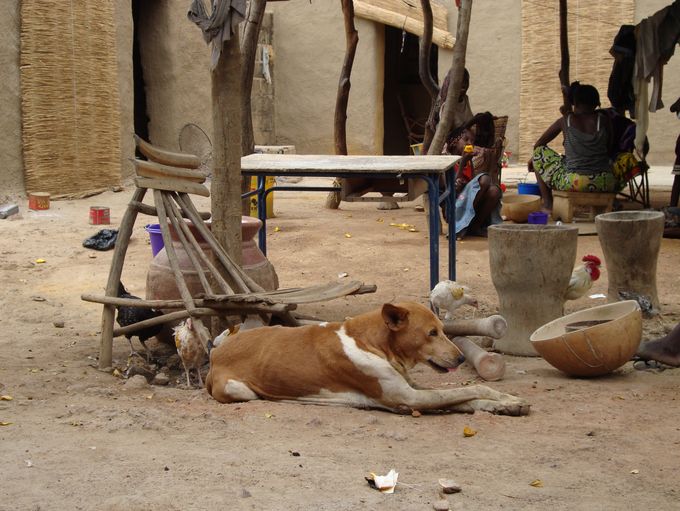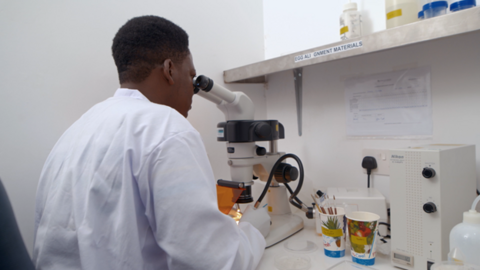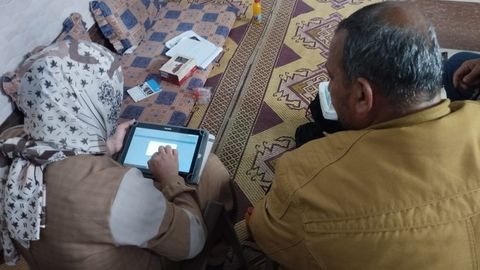Scientists Apply Game Theory to End Rabies
30.08.2023
Elimination of rabies in Africa could be within reach through a more coordinated One Health approach. An innovative study by Swiss TPH and partners applied game theory to tackle rabies challenges and identified effective strategies for affected countries. The paper, published today in Nature Communications, demonstrates that a more coordinated approach could end this fatal disease and result in major health, economic and social gains.

Scientists found that through better coordination, rabies could be eliminated. What sets this study apart is its application of game theory to a public health problem. (Photo: Stephanie Mauti, Swiss TPH)
Rabies is a neglected tropical disease (NTD) that still causes an estimated 59’000 deaths annually, many of which are children. The disease is almost exclusively transmitted through dog bites. Once symptoms appear, rabies is 100% fatal. Rabies is preventable through vaccination of dogs and avoiding dog bites. After potential exposure to an infected dog, people can seek post-exposure prophylaxis (PEP). The World Health Organization (WHO) estimates the annual global costs associated with rabies at USD 8.6 billion and aims to reach zero human deaths from rabies by 2030.
Game theory to tackle rabies
A study by Swiss TPH researchers and partners now demonstrates that a coordinated One Health strategy would bring elimination of rabies within reach, resulting in overall welfare gains of an estimated USD 9.5 billion in the next 30 years. What sets this study apart is its application of game theory to a public health problem. Game theory is a mathematical tool for analysing self-interested and cooperative choices. In the case of rabies, different strategies – such as mass dog vaccination or PEP – with and without coordination can be compared through game theory to identify the strategies that are most beneficial for all.
“As rabies can also be re-imported across borders, a country’s effort in rabies elimination becomes dependent on the action of others,” said Jakob Zinsstag, Head of the Human and Animal Health unit at Swiss TPH and senior author of the study. Through a benefit-cost study, the research team could demonstrate that by implementing dog mass vaccination and PEP in a coordinated manner across endemic countries, rabies can ultimately be eliminated.
Cooperation is the most profitable choice
“Through our analyses, we identified two groups of countries. For the first group – including countries such as Chad and Nigeria –, mass vaccination of dogs is always the most beneficial and rational choice independently of the action of other countries,” said Alvar Bucher, co-first author and Master student at Swiss TPH. “For the second group of countries, including Algeria and South Africa, the benefits of mass dog vaccination only materialise if everyone else invests in the same strategy.”
In the absence of coordinated action, the most rational choice for the second group is to invest primarily in PEP. “We found, however, that cooperation – where all countries mass vaccinate dogs – leads to the greatest average payoff for everyone and is therefore the most profitable choice in the long run for all countries,” said Artemiy Dimov, co-first author and PhD student at Swiss TPH.”
One Health to tackle zoonoses
According to WHO, 60% of emerging infectious diseases that are reported globally are zoonoses, diseases that are transmitted between animals and humans. The public health sector cannot tackle such diseases alone. “The study underlines the importance of a One Health approach – the collaboration between the public health, veterinary and environmental sectors to fight zoonoses, such as rabies,” explained Zinsstag. “Our paper provides a roadmap for policymakers and health authorities to prioritize collaborative and intersectorial strategies in fighting zoonoses.”
About the study
The study was published on 7 September 2023 in the peer-reviewed journal Nature Communications.
Bucher A, Dimov A, Fink G, Chitnis N, Bonfoh B, Zinsstag J. Benefit-cost analysis of coordinated strategies for control of rabies in Africa. Nature Communications 2023.
Contact

Jakob Zinsstag
Professor, PhD, DVM
Deputy Head of Department, Head of Unit, Group Leader
+41612848139
jakob.zinsstag@swisstph.ch
Stay connected to global health
Subscribe to the Swiss TPH newsletter for updates on research, projects, education, jobs and events.


